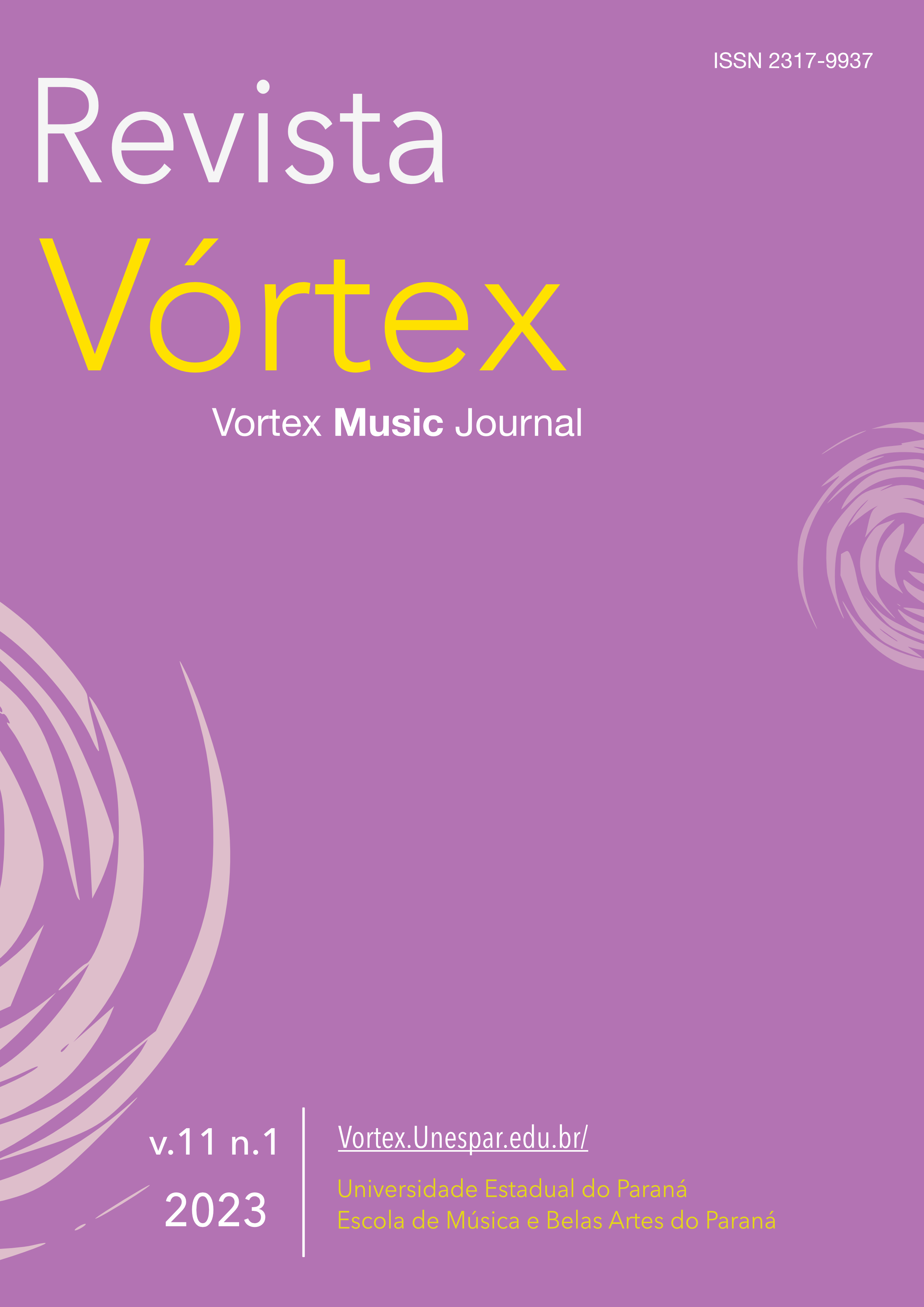Notas especulativas sobre sofrimento psíquico e performance musical
DOI:
https://doi.org/10.33871/23179937.2023.11.1.7117Palavras-chave:
Performance musical, Supereu, Sublimação, Pulsão de morte, Tradição conservatorialResumo
Propondo uma análise do sofrimento psíquico que pode atingir os músicos em situação de performance, o texto avança algumas considerações com base na metapsicologia de Sigmund Freud e em uma percepção crítica da formação dos intérpretes musicais. Procura-se, num primeiro momento, examinar as exigências éticas e morais sobre o intérprete situando-as metapsicologicamente como superegóicas. Em seguida, investigam-se possíveis relações entre Supereu, pulsão de morte e sublimação na produção de práticas insalubres no estudo e preparação de performances. Consideram-se nesta reflexão as relações do Eu com suas instâncias ideais no que podem contribuir para o estímulo ou supressão da sublimação. Uma última seção consiste na análise de passagens do romance O náufrago, de Thomas Bernhard, em que estas são cotejadas com as hipóteses anteriormente apresentadas.
Downloads
Referências
ALMEIDA, Alexandre Zamith. Por uma visão de música como performance. Opus, Porto Alegre, v. 17, n. 2, p. 63–76, 2011.
BAILLY, Anatole. Dictionnaire Grec Français. Paris: Hachette, 2000.
BERNHARD, Thomas. O náufrago. 2. ed. São Paulo: Compainha das Letras, 2006.
BITTAR, Valeria Maria Fuser. Músico e ato. 2012. Tese de Doutorado - Universidade Estadual de Campinas — Instituto de Artes, Campinas, 2012.
CERVANTES, Miguel. Dom Quixote. Dois Irmãos: Clube de Literatura Clássica, 2021.
CHURCHER, John. Conversation and Interpretation. Em: 2002, Manchester. Anais [...]. . Em: NORTH WEST INSTITUTE OF DYNAMIC PSYCHOTHERAPY CONFERENCE ON FORM AND FEELING. Manchester Disponível em: https://www.researchgate.net/profile/John_Churcher/publication/277712234_Conversation_and_Interpretation/links/5570cd9e08aedcd33b29303a.pdf. Acesso em: 30 ago. 2022.
CLÉRO, Jean-Pierre. Concepts lacaniens. Cités, Paris cedex 14, v. 16, n. 4, p. 145–158, 2003. DOI: 10.3917/cite.016.0145. Disponível em: https://www.cairn.info/revue-cites-2003-4-page-145.htm
CUNNINGHAM, Valentine. It is no sin to limp. Journal of Literature & Theology, [S. l.], v. 6, n. 4, p. 303–309, 1992.
DIEHL, Sara Lyn. A Selected Review of Prevention and Non-Surgical Treatment Options for Musculoskeletal Performance-Related Injuries Common Among Oboists. 2016. Doctoral Essay - University of Miami, Coral Gables, 2016.
DORSCHEL, Andreas. Music as Play: A Dialogue. Em: Virtual works, actual things: Essays in music ontology. Leuven: Leuven University Press, 2018. p. 115–135.
FREUD, Sigmund. O Inconsciente. Em: Introdução ao Narcisismo, Ensaios de Metapsicologia e outros textos (1914-1916). Obras completasSão Paulo: Compainha das Letras, 2010. p. 99–169.
FREUD, Sigmund. O Mal-Estar na Cultura [Das Unbehagen in der Kultur]. Em: Cultura, sociedade e religião: O mal-estar na cultura e outros escritos. Obras Incompletas de Sigmund FreudBelo Horizonte: Autêntica, 2020. a. p. 305–410.
FREUD, Sigmund. As pulsões e seus destinos. Belo Horizonte: Autêntica, 2020. b.
FREUD, Sigmund. Além do princípio de prazer. Belo Horizonte: Autêntica, 2020. c.
FULGÊNCIO, Leopoldo. As especulações metapsicológicas de Freud. Natureza humana, [S. l.], v. 5, n. 1, p. 129–173, 2003. Disponível em: http://pepsic.bvsalud.org/scielo.php?script=sci_abstract&pid=S1517-24302003000100005&lng=pt&nrm=iso&tlng=pt. Acesso em: 25 maio. 2021.
GIL, Susana Castro. Virtuositas noster qui es in Parnaso. 2021. Disponível em: https://www.researchcatalogue.net/view/759860/760126. Acesso em: 24 ago. 2022.
GOEHR, Lydia. Being True to the Work. The Journal of Aesthetics and Art Criticism, [S. l.], v. 47, n. 1, p. 55–67, 1989. DOI: 10.2307/431993. Disponível em: http://www.jstor.org/stable/431993. Acesso em: 27 maio. 2021.
GOETHE, Johann Wolfgang. Fausto. Dois Irmãos: Clube de Literatura Clássica, 2022.
ISRAËL, Lucien. Introduction. Em: Boiter n’est pas pécher. HypothèsesToulouse: Érès, 2010. p. 9–16. Disponível em: https://www.cairn.info/boiter-n-est-pas-pecher--9782749212968-p-9.htm
KLICKSTEIN, Gerald. The Musician’s Way: A Guide to Practice, Performance, and Wellness. New York: Oxford University Press, 2009.
LATTANZIO, Felipe. Por que criamos? Reflexões psicanalíticas sobre a gênese da arte. Moscaico: estudos em psicologia, [S. l.], v. III, n. 1, p. 1–11, 2008.
LIMA, Ronise Costa; SILVA, Talita Naiara Rossi; ALVES, Gisele Beatriz de Oliveira; SAMPAIO, Rosana Ferreira; FONSECA, João Gabriel Marques; LACERDA, Leonardo Lobão; PINHEIRO, Tarcísio Márcio Magalhães. Comprehensive Health Care Program for Performing Artists: account of the experience developed in an University service in Minas Gerais. Revista de Terapia Ocupacional da Universidade de São Paulo, [S. l.], v. 27, n. 2, p. 221–227, 2016.
NATTIEZ, Jean-Jacques. O combate entre Cronos e Orfeu. Ensaios de semiologia musical aplicada. São Paulo: Via Lettera, 2005.
PERALDI, Nicolas. Boiter n’est pas un péché: L’exclusion comme enfermement. Esprit (1940-), [S. l.], n. 330 (12), p. 24–43, 2006. Disponível em: http://www.jstor.org/stable/24259115. Acesso em: 30 ago. 2022.
POURADIER, Maud. La musique disciplinée. Le contrôle de la musique dans les conservatoires français du XIX e siècle. Musurgia, [S. l.], v. 14, n. 1, p. 5–13, 2007. Disponível em: http://www.jstor.org/stable/40591474. Acesso em: 25 ago. 2020.
RABELO, Laura Cohen. Canção sem palavras. Belo Horizonte: Scriptum, 2017.
RABELO, Laura Cohen. Caruncho. Belo Horizonte: Impressões de Minas, 2022.
REGELSKI, Thomas A. The Aristotelian Bases of Praxis for Music and Music Education as Praxis. Philosophy of Music Education Review, [S. l.], v. 6, n. 1, p. 22–59, 1998. Disponível em: http://www.jstor.org/stable/40327113. Acesso em: 26 ago. 2022.
REIS, Carla Silva. O piano na universidade brasileira: trajetórias em contraponto. Curitiba: Appris, 2020.
RINK, John. The Work of the Performer. Em: DE ASSIS, Paulo (org.). Virtual Works – Actual Things. Essays in Music Ontology[s.l.] : Leuven University Press, 2018. p. 89–114. DOI: 10.2307/j.ctv4rfrd0.7. Disponível em: http://www.jstor.org/stable/j.ctv4rfrd0.7. Acesso em: 4 out. 2020.
ROUDINESCO, Elizabeth; PLON, Michel. Dicionário de psicanálise. Rio de Janeiro: Zahar, 1998.
TRAVASSOS, Elizabeth. Apontamentos sobre estudantes de música e suas experiências formadoras. Revista da ABEM. Porto Alegre, v. 12, p. 11–19, 2005.
WEB GALLERY OF ART. Disponível em: <https://www.wga.hu/frames-e.html?/html/r/ribera/2/index.html>. Acesso em 16 mai. 2023.
Downloads
Publicado
Como Citar
Edição
Seção
Licença
Copyright (c) 2023 Luigi Brandão, Flavio Barbeitas

Este trabalho está licenciado sob uma licença Creative Commons Attribution 4.0 International License.
Autores mantêm os direitos autorais e concedem à revista o direito de primeira publicação, com o trabalho simultaneamente licenciado sob a Licença Creative Commons Attribution que permite o compartilhamento do trabalho com reconhecimento da autoria e publicação inicial nesta revista.






